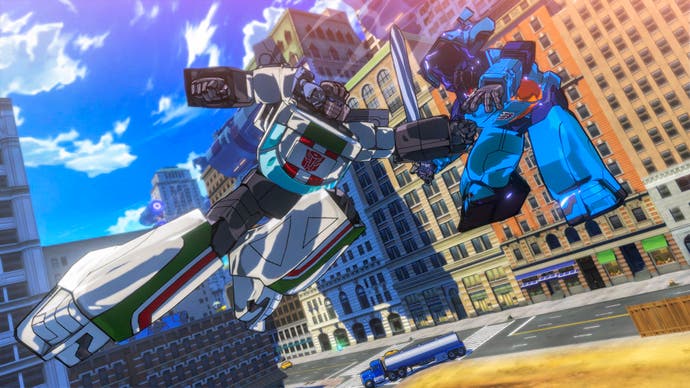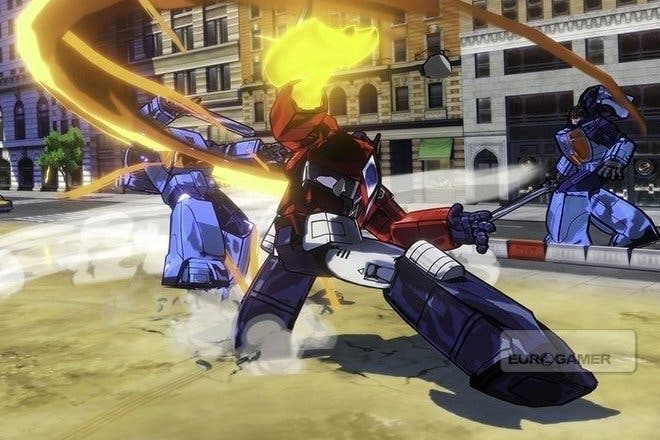Transformers: Devastation review
Optimus time.
There is only one attack that's able to puncture Megatron's shield, which throbs rather un-menacingly in fetching pink. First Bumblebee must transform into a car (not the testosterone-ripped Chevrolet Camaro of Michael Bay's brash trio of scrapyard-assault films, but rather a cutesy Choro-Q-esque love bug). Then, by driving in tight circles, you must find top speed. Once the necessary momentum has been gained, aim at Megatron and, milliseconds before you crash into his shield, transform back into your mecha form, animating into a farcical uppercut as you do so. The shield shatters into pink shards and Megatron is knocked into the air.
A light flashes in Bumblebee's eye, signalling a new opportunity: strike the transform button in time and, in a single, balletic move, he'll curl back into the shape of the car, rev on the spot (causing sparks to fly improbably from his rear wheels) before launching at Megatron for the follow-up strike, and another, and another. There's more. Back into robot form and, while still airborne, the combo can be continued with a flurry of punches. As the pair thud back to the ground Megatron's eye glints red, signalling the counter attack. Hit the evade button at the right moment and Bumblebee will pull out of his punch, and slide elegantly through Megatron's legs. Time slows. The air turns a moody shade of blue and, in this precise moment, know that you are experiencing a hyperrealistic recreation of how it feels to be a Transformer in every eight-year-old's imagination.
The pitch is simple and strong: Transformers Devastation is a revisiting of the 1980s Transformers cartoons, as seen through the eyes of Platinum Games, a Japanese studio which, since the quiet decline of Treasure, has become the best action game developer in the world. While this is clearly a game made on a semi-tight budget (the game takes place in just two primary locations, while the enemies you meet come from a small, repetitive selection; the brisk story mode is designed for multiple replays as a way to stretch out the game's substance) it feels luxurious and well crafted in these hands. No doubt some lines of code have been lifted from Platinum's more lavish titles - Bayonetta, Metal Gear Rising, Vanquish - as the combat in Transformers Devastation is as refined as in any of its back catalogue. Dodge an incoming attack at the last second and you'll initiate 'Focus', where time is slowed in exactly the same manner as Bayonetta's Witch Time. After the disappointment that was last year's The Legend of Korra, another cut-price downloadable title from the studio's pairing with Activision, this is a laudable land grab for the mid-tier console game territory, an area that has been almost squeezed out of existence in recent years by the lavish blockbusters on one side, and the legion of plucky independent on the other.

After an introduction during which you're shown the basics of combat, you're free to choose between a number of Autobot protagonists -- three initially, five eventually. Each handles in much the same way, albeit with different types of combo-ending attack and special move. Combos are strung together by linking strings of light and hard attacks, and these can be interspersed with Transformations whenever a blue light glints off your bodywork, or one of two special moves, made available when the relevant gauge is filled. This is no dull button-masher. Later you're able to purchase the kind of attacks you're more likely to find in Street Fighter than a third-person brawler. One, the parry, which allows you to nullify all damage from an incoming attack by pressing in the direction of the attacker at the precise moment of impact has been lifted directly from Street Fighter III: Third Strike. This is a game that allows for sumptuous levels of showboating for the talented player. As in Bayonetta, each skirmish is rated from 'D', the worst, to 'SS', the highest. Earning anything above a 'B' rank will require you to use a rich array of mix-ups, special moves, defensive slides and counterattacks.
The game's structure is best described as open world-lite. Budget has restrained the geography. The starting city is a network of corridor streets that criss-cross in interesting, disorientating ways. There are numerous collectibles dotted around and chests that contain power-ups and new weapons. Mostly you travel as a car between wider areas where you battle bosses (often two at a time). Platinum adds variety with car chase sequences (the roads often include booster portals which, if driven through, will propel your car forward at a speed which can break barriers). In the game's mid-section there is some plaforming, but combat provides the main attraction. You can return to the Autobots' Ark headquarters often to arrange and synthesise any weapons you've collected. Combining weapons allows you to transfer buffs between pieces of equipment, and, as each of the five playable characters - Optimus, Bumblebee, Sideswipe, Wheeljack, and Grimlock - has four weapon slots, the game affords you considerable scope for customisation. Each Transformer also has two slots of equippable chips. These must be made in Wheeljack's workshop via a micro-game that involves a mixture of skill and luck.
Platinum is to be praised for filling such a relatively small container with so many ideas. Nevertheless, for some it may not be quite enough. The story mode can be finished in a few hours and, unless you head back in as a different character, or at one of the other two difficulty levels, you will likely be replete. Fifty short challenges provide extra curricular activity, but these soon prove repetitive. No matter. Platinum's game draws out much of the smooth, knockabout fun of the hyperactive cartoon-world of early Transformers, which has otherwise been lost to time. This is the best Transformers game since Melbourne House's memorable 2004 game. Its best tricks may have been pilfered from Platinum's back catalogue, but they're no less appealing in disguise.



